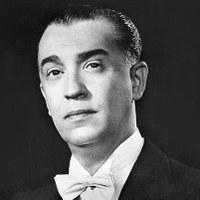Diamantina, 1902 – Rio de Janeiro (Brasil), 1976
By Marcel Gomes
The president who executed the boldest economic development program of the 20th century and transferred the capital from Rio de Janeiro to Brasília, Juscelino Kubitschek was the most prominent statesman of the short democratic period between the Estado Novo (1930-1945) and the military dictatorship (1964-1985). JK’s political history began shortly after the anti-Getúlio military uprising by the Paulista oligarchy (the so-called Constitutional Revolution of 1932). A doctor, he was called upon to assist the forces of Minas Gerais in the war against São Paulo. On the battlefield, he became friends with Benedito Valadares, who would later be appointed by Getúlio Vargas as the interventor in Minas Gerais.
With a knack for engaging with the poor population, he ran for federal deputy in 1934, winning with a large number of votes. He served as a legislator until 1937, when Vargas staged the coup that instituted the Estado Novo and closed the Chamber. He would only return to politics in 1940, when he was appointed, again by Valadares, as mayor of Belo Horizonte. In office, he invested in infrastructure projects, opened avenues, channeled rivers, and built bridges that connected distant areas to the city center.
He left the mayoralty of Belo Horizonte in 1945, along with Valadares and Vargas, after the end of the Estado Novo. Subsequently, he was elected as a constituent federal deputy. His political career reached its peak the following decade, when he won the elections for the governor of Minas Gerais in 1950, and for the presidency of the Republic in 1955. Elected president by the Social Democratic Party (PSD), his campaign slogan was “fifty years in five”: fifty years of progress in five years of government.

During his presidency, the developmentalist ideology took shape in the “Plano de Metas” (Goals Plan), which aimed to accelerate the industrialization process. In response to the International Monetary Fund’s (IMF) recommendation to cut public spending, JK chose to break with the IMF and even advocated for the resumption of Brazilian relations with the Soviet Union and other countries in the socialist bloc in order to gain new markets. Weakened by criticism, Juscelino failed to elect his successor, General Henrique Lott of the PSD, who lost the presidential elections in October 1960 to Jânio Quadros of the conservative National Democratic Union (UDN).
The creator of Brasília, however, left his administration with enough credibility to run in the 1965 elections – a candidacy that was blocked by the military coup of 1964. In his farewell letter, written by hand in 1961, JK addressed the Brazilian people to highlight what he considered to be his greatest achievement: the execution of the plan that culminated, five years after its start, with the fulfillment of the “democratic goal,” meaning free elections to define his successor.
Unable to run for re-election, he ran for the Senate in 1960, winning a seat. However, the military coup of 1964 annulled his mandate, and JK went into exile in Europe. In 1966, alongside former Guanabara Governor Carlos Lacerda and former President João Goulart, he participated in the creation of the Frente Ampla (Broad Front), an opposition movement against the regime, an initiative that would be dissolved in 1968 with the increase in repression. The end of the movement also marked the end of his political life. The man who said that governing was about building roads died in August 1976 in a car accident on the Via Dutra, the highway connecting São Paulo to Rio de Janeiro.



